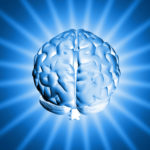Sharpening Memory and Mind
You’re standing in the produce isle when you see a familiar face. Smiling, she pushes her cart in your direction. You blank on her name. There’s no escape now. “Hey you!”
Or perhaps you arrive home from your shopping trip only to realize you forgot the main thing you went out for, like TP. Then there’s that data you left out of your report, and the call you forgot to return.
When enough of these add up, you might suspect the worst: Alzheimer’s. More likely, it’s cortisol run amok. Still this should give you pause. Stress and its aftermath – chronically elevated cortisol – not only leads to forgetfulness, but can damage your brain, setting you up for dementia.
Cortisol, our main stress hormone, is a doubled edged sword when it comes to memory: just enough can hone your memory and cognition whereas too much can leave you anxious, fog up your thinking and block recall. If cortisol levels peak at night, you’re likely to lie awake for hours rehashing your day, only worsening your brain fog and forgetfulness the next day. Lack of sleep also damages brain tissue.
The adrenals produce cortisol to enable us to cope with stress, like sick kids, a fender bender, or nasty dog you need to outrun. Normal levels keep our energy up, blood sugar and blood pressure balanced and our mind sharp when things get dicey. We perform best and sleep deeply when the adrenals are releasing optimal amounts of cortisol: a gentle rise upon waking, then dialing back at night.
A quick cortisol bump can help us get through a stressful situation, but chronically elevated cortisol not only blocks memories and prevents sleep, it can actually damage the brain. Elevated levels of cortisol likely contribute to senile dementia, including and Alzheimer’s disease.
The following are some basics for balancing your cortisol levels in order to keep calm as well as promote and protect memory and mental function.
1. Maintain blood sugar levels: Skipping meals or noshing on high carb snacks disrupts your supply of brain fuel: glucose. Eat three meals a day, each with plenty of protein plus a generous dose of good fat. Add minerals for blood sugar control if you need them.
2. Eat fat: Aside from water, your brain is mainly fat. Good fats, coupled with cholesterol, enhance brain health. Cholesterol promotes nerve cell growth. Fats help keep blood glucose levels stable, optimizing the brain’s fuel supply. Fat protects your neurons, the keys to memories and learning. Fats enable us to absorb brain nutrients. Medium chain fats, such as coconut oil, promote ketones, which protect the brain and can reverse symptoms of Alzheimer’s disease.
3. Avoid concentrated sweets. Indulging in sodas, fruit juice, candy, yogurts, and other sugary treats leads to peaks and valleys in blood and brain glucose, which disrupts brain function and memory. Animal studies show fructose, in particular (think sodas and advertised cereals and candy), even ages brain cells, compromising brain function and memory.
4. Calm down. A daily inner awareness activity goes a long way to enhancing mental performance. Calming alpha and theta brain waves are healing and enable us to realize the bigger picture as well as recall the details. Options include anything from walking in nature or sitting by a stream, to meditating, tai chi, yoga, or a soak in a hot tub.
5. Move: Activity reduces cortisol and other stress hormones while stimulating growth factors that promote new brain cells and blood vessels. One recent study found regular aerobic exercise can enlarge the hippocampus, the part of the brain involved in memory and learning. Take a walk, dance with your kids, ride your bike, swim, hike, or weed your garden.
6. Sleep: Poor quality sleep not only leaves you fatigued and groggy, it can cause memory loss and brain deterioration. Chronic insomnia can lead to dementia according to a study at University of California, Berkeley. Deep sleep is healing to the brain plus it enables us to store memories. If you suffer insomnia, email me; I can help. Sleep is as important to health as nutrition.
7. Supplement wisely: Adaptogens are a powerful group of botanicals and supplements that work beyond diet not only to balance cortisol, but promote deep sleep and boost brain function and memory in other ways. Some can repair damaged brain tissue. I have my own favorite that has me enjoying the deepest sleep in years, plus a noticeably shaper memory. I’l share this with you in an upcoming post and a new ebook.
Watch for my new ebook on boosting memory and cognition. If you have questions or concerns, comment here.


Hi Linda,
Can you tell me when you e-book Sharpening Memory and Mind is due out?
Thanks for your interest. I have been so swamped with clients haven’t had a chance to move forward on this. Sorry I can’t give you a time. Tell me more about your interest and I can address it in blog posts.
Can’t wait to see your e-book!!! Thank you for the above advice. More reason to continue physical exercise!!!
Hi Linda,
How are you?
Would love advise on achieving good, restful and deeper sleep as I wake up often during the night and not refreshed in the morning.Thank you.
Knowing more about your sleep issue is key to offering the right help. Are you waking up at a certain time, and if so what time? is it mental loops or worries keeping you up? night sweats? Does pain or itching wake you? Are you using your tablet or phone or other device before bed? This is really just the start. What is your caffeine intake? If no other health issues, I am guessing an hour consult would get you what you need, but I can make some suggestions here.